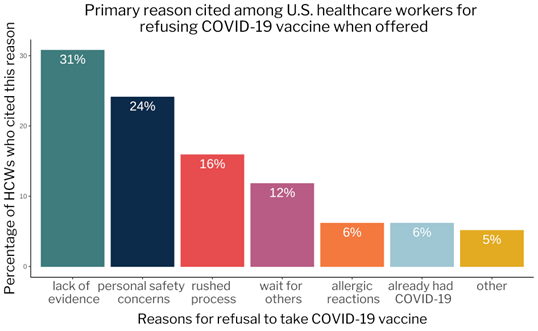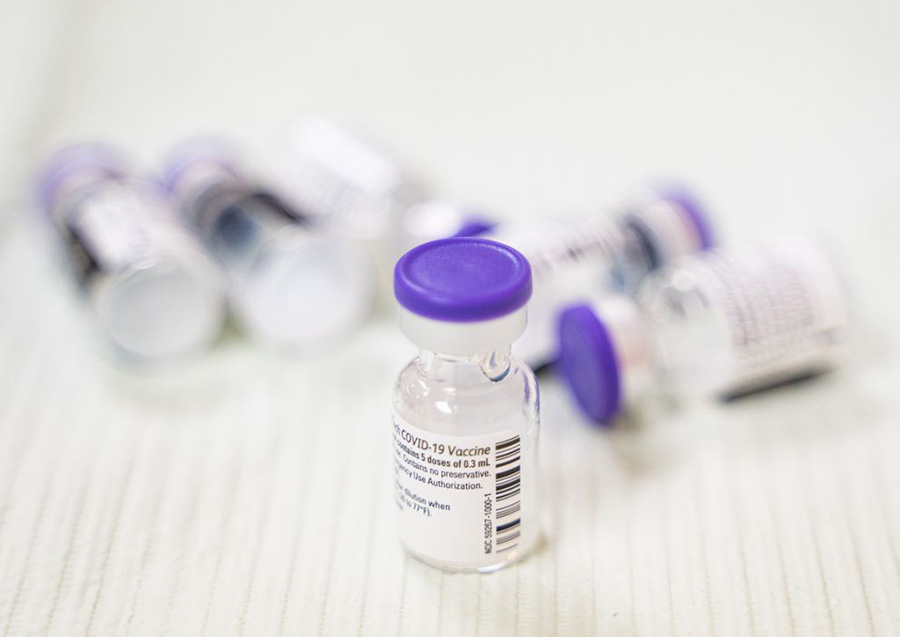It’s been established that one-quarter of Americans won’t take the vaccine—what’s perhaps more surprising for health care CEOs is that a decent percentage of those people come from within their own organizations.
According to recently released data from Surgo Foundation, 15 percent of health care workers who have been offered an approved COVID-19 vaccine have refused to take it. This includes physicians, nurses, dentists, health technicians, EMS personnel, physician therapists, home health workers, administrative and operations staff.
The reasons for vaccine refusal among health care workers varies from lack of evidence of the vaccines’ effectiveness and safety (31 percent and the most common reason), personal safety concerns (24 percent); and worrying that the vaccine approval process has been rushed (16 percent). The refusal rate was highest for health technicians, EMS personnel, physician therapists, and home health workers. Physicians, nurses, and dentists were second and health administrative staff were third in refusal rate.
Similar to the general public, the breakdown of refusal was partisan as well. It was highest for Republicans (18 percent refused), followed by Independents (16 percent) and lowest for Democrats (8 percent).

Credit: Surgo Foundation
“Even 15 percent of health care workers refusing the COVID vaccine is too high. We need all healthcare professionals to set the right example in these early days, because we still have a lot of work to do to convince the rest of the country to take the COVID vaccine,” stated Hannah Kemp, Director of Programs at Surgo Ventures.
For those concerned about the safety of the vaccine, Georges Benjamin, MD, Executive Director of the American Public Health Association, suggests health care leaders emphasize the word “research” in their messaging rather than “discovery” or using “invent.” “Research is a word that people hear better. When we talk about medical research vs. the pharmaceutical companies, a lot of people have negative thoughts on pharma companies, but they don’t have strong feelings on medical researchers themselves,” he says.
When conveying a message of vaccine safety, the word “every” is critical when talking about the vaccine development process, experts say. (For example, “Every study, every phase, and every trial were reviewed by the FDA and a safety board.”)
Challenges in long-term facilities
Still, there will be an uphill climb in convincing many to take the vaccine, especially for those who work in long-term care, according to experts interviewed by NBC News. According to the American Health Care Association, cited in that article, 50 percent of long-term care workers refuse to get vaccinated, a number that is even higher than Surgo Foundation’s estimates.
Many people who work in these organizations are people of color, which have the highest percentages of people who are hesitant to take the vaccine. Along with the safety reasons mentioned above, some are also concerned that if they have to take the vaccine, they’ll get sick and have to miss work. As such, some nursing home facilities are offering financial incentives for staff to take the vaccine. “People responded pretty well to that. I think it helped convince a handful more people at the last minute to say, ‘I’m going to do this,'” Sondra Norder, the president and CEO of St. Paul Elder Services, told NBC News.
This is a much better strategy, experts say, than trying to force workers into taking the vaccine. A few long-term care companies have done exactly that. “It is laziness on the part of anyone to force these folks to take a vaccine. I believe that we need to be putting all of our energy into respecting, honoring and valuing the work they do and educating them on the benefits to them and the folks they take care of in getting vaccinated,” Mike Wasserman, MD, former president of the California Association of Long Term Care Medicine, told The New York Times.
Homepage photo: Oregon Health & Science University administered its first COVID-19 vaccine injections to healthcare workers on Wednesday, Dec. 16, 2020. Shown here are vials of the Pfizer BioNTech COVID-19 vaccine that were given. (OHSU/Fritz Liedtke)










